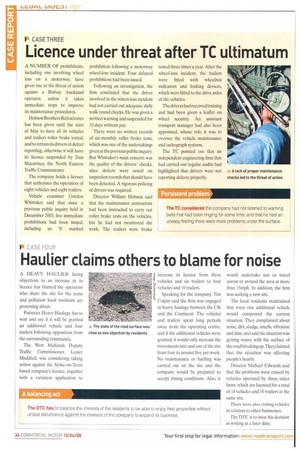I CASE THREE
Page 36

If you've noticed an error in this article please click here to report it so we can fix it.
Licence under threat after TC ultimatum
A NUMBER OF prohibitions, including one involving wheel loss on a motorway, have given rise to the threat of action against a Bishop Auckland operator, unless it takes immediate steps to improve its maintenance procedures.
Hobson Brothers Refractories has been given until the start of May to have all its vehicles and trailers roller brake tested. and to retrain its drivers in defect reporting, otherwise it will have its licence suspended by Tom Macartney, the North Eastern Traffic Commissioner The company holds a licence that authorises the operation of eight vehicles and eight trailers.
Vehicle examiner Gordon Whittaker said that since a previous public inquiry held in December 2003, five immediate prohibitions had been issued, including an 'S' marked prohibition following a motorway wheel-loss incident. Four delayed prohibitions had been issued.
Following an investigation, the firm concluded that the driver involved in the wheel-loss incident had not carried out adequate daily walk round checks. He was given a written warning and suspended for 10 days without pay.
There were no written records of six-monthly roller brake tests, which was one of the undertakings given at the previous public inquiry. But Whittaker's main concern was the quality of the drivers' checks, since defects were noted on inspection records that should have been detected. A rigorous policing of drivers was required.
Director William Hobson said that the maintenance contractors had been instructed to carry out roller brake tests on the vehicles, but he had not monitored the work. The trailers were brake tested three times a year. After the wheel-loss incident, the trailers were fitted with wheelnut indicators and locking devices, which were fitted to the drive axles of the vehicles.
The drivers had received training and had been given a leaflet on wheel security. An assistant transport manager had also been appointed, whose role it was to oversee the vehicle maintenance and tachograph systems.
The TC pointed out that an independent engineering firm that had carried out regular audits had highlighted that drivers were not reporting defects properly.












































































































































































































